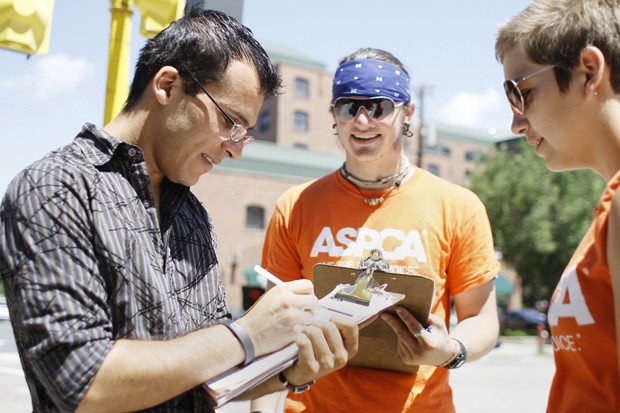Some consider it a season of enthusiastic political fervor. Others, like area businesses, might see it as an annual infestation.
Every summer, canvassers representing environmental and civil rights nonprofit organizations can be found daily on the streets of Dinkytown and Stadium Village.
Canvassers are employees of national groups like Grassroots Campaigns Inc. or Fund for the Public Interest, not the American Society for the Prevention of Cruelty to Animals, Equality California or any of the nonprofits they stand there to represent. The groups typically hire the umbrella campaign organizers to canvass and fundraise.
Many of the canvassers, like Jim Kilbride, who donned the ASPCA cap last week, get the job to get their foot in the nonprofit door.
“It’s a way to wade into it,” Kilbride said.
Cole Andree said he originally approached a GCI canvasser about racking up volunteer hours but ended up working for them when he found out it was a paid position.
In the first three days on the job, canvassers must collect $110 in total donations, Kilbride said. Passersby can donate one-time donations or sign up for a monthly pledge. Canvassers do not accept cash.
Donors on average continue the monthly pledge for seven months, so seven months’ worth of donations is counted toward a canvasser’s daily quota, Kilbride said.
On a good day, a canvasser secures five or six donations, GCI field manager and Gustavus Adolphus College senior Nicole Meyer said.
GCI canvassers like Kilbride work five days a week and make between $300 and $550 weekly, depending on location, according to the GCI website. Hourly wage is approximately $8, Kilbride said.
For businesses, the canvassers can impede foot traffic and business.
“On one occasion … we had canvassers right outside of our door,” said Rex Vogen, manager of Espresso Royale in Dinkytown. Canvassers were catching students as they entered or left the coffee shop, Vogen asked them to leave, and they obliged.
“That was the end of that,” he said.
On the flip side, the canvassers also bring business to Espresso Royale by having their meetings there, Vogen said.
Overall, he said business is actually better with canvass season in full swing.
A similar case is true for the House of Hanson grocery store, owner Laurel Bauer said. Though the canvassers bring business into the store, Bauer’s year-round customers are regularly pestered.
“I’ve definitely experienced customers that have said they don’t want to come down here” because they are approached by canvassers every time, she said.
Despite a general reputation of having little spending money, Meyer said campuses are good canvassing grounds because college students are more open to different causes.
Even if passersby are not interested in donating, the main goal for Meyer and her colleagues is “to have a good conversation about the cause,” she said.
To prepare for these conversations, canvassers go through extensive training and learn scripts about the cause they will represent on any given day, Kilbride said.
Meyer said she and her colleagues are prohibited from canvassing near ATMs or on private property.
The University of Minnesota is a public school and therefore all exterior spaces are public property. A permit would only be required to set up a table, which canvassers do not do, University spokesman Dan Wolter said.
Bauer suggested moving the canvassers around more, as she sees them near her store, on the corner of 14th Avenue and Fifth Street Southeast every single day.”
Bauer said since there are two different umbrella organizations working with canvassers, they oftentimes overlap schedules and overwork an intersection.
Meyer said directors of both the Fund and GCI talk to make sure workers for each don’t overlap.
The Fund and GCI regional and national offices did not return multiple requests for comment on pay structure and businesses’ concerns.
Nonetheless, Bauer asked that the canvassers “give the corner a little break every once in a while.”
Canvassers cover campus, businesses complain
The annual fundraising season can be frustrating for local business owners.

Image by Mark Vancleave
Ahmad Harb fills out a donation form with America Society for the Prevention of Cruelty to Animals petitioners Cole Andree and Nicole Meyer Friday on the corner of Harvard Street and Washington Avenue.
Published July 14, 2010
0

